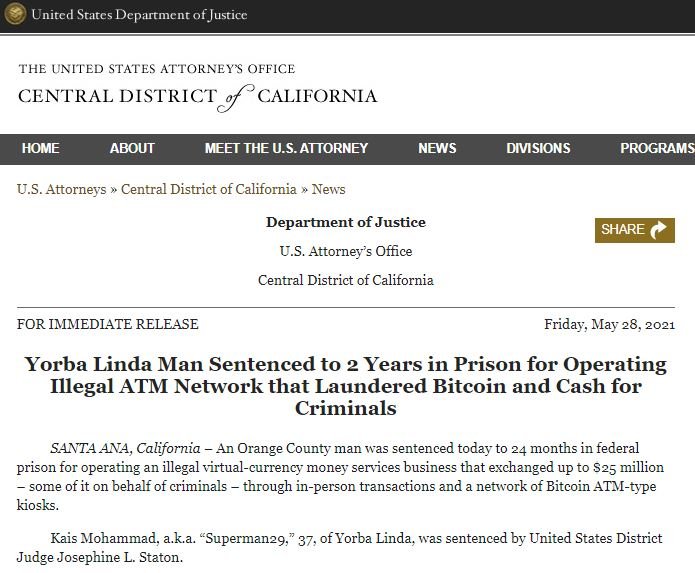The U.S. Department of Justice (DOJ) announced that Kais Mohammad, also known as “Superman29” has been sentenced to two years in prison for his involvement as an operator of an illegal cryptocurrency platform on which transactions of up to $25 million USD would have been made. The 37-year-old Orange County resident provided his services in person and through a network of Bitcoin ATMs.
The defendant pleaded guilty to a total of three counts of money laundering, operating unlicensed banking transactions and breaching the anti-money laundering law. According to prosecutors, in addition to serving his sentence Mohammad will deliver to the U.S. government about $22,000 USD in cash, 18 units of Bitcoin, 222 units of Ethereum and the operation of 17 cryptocurrency ATMs

The fraud was operated between December 2014 and November 2019, during which time the defendant served as the owner and director of Herocoin, a services company related to the world of cryptocurrencies. Mohammad offered the exchange of Bitcoin for cash with commissions of up to 25%, a much higher percentage than the average rate in the market.
“Using the pseudonym ‘Superman29’, the defendant advertised his bitcoin buying and selling services online, offering transactions of up to $25,000 USD. The mode of operation usually required a personal meeting to finalize the transaction and was highlighted by Mohammad’s discretion, who did not usually ask anything about the origin of the money nor did he have a method to investigate his potential clients,” the court documents state.
The defendant processed the money received at his Bitcoin ATMs, which materialized the transaction and initiated a monitoring protocol for the identification of each operation.
On Herocoin, prosecutors mention that the cryptocurrency company was never registered with the Financial Crimes Enforcement Network (FinCEN), a specialized unit of the Treasury Department. It should be clarified that companies registered with FinCEN must submit detailed reports of any transaction over $10,000 USD.
A key element in Mohammad’s fraudulent operation was bitcoin ATMs, which allowed its customers to transact up to $3,000 USD unlimitedly and without submitting any report to the financial authorities. After receiving a letter from FinCEN requesting the registration of his company, the defendant began some procedures that were unfinished.
Shortly afterwards FinCEN put Herocoin in the sights of its agents, as the activities of Mohammad and his clients ceased to go unnoticed by the authorities. In early 2019 FinCEN launched an investigation with an undercover agent, who posed as a potential client to find out all about the fraud operated by Mohammad, which eventually led to the defendant’s arrest.
To learn more about information security risks, malware variants, vulnerabilities and information technologies, feel free to access the International Institute of Cyber Security (IICS) websites.

He is a well-known expert in mobile security and malware analysis. He studied Computer Science at NYU and started working as a cyber security analyst in 2003. He is actively working as an anti-malware expert. He also worked for security companies like Kaspersky Lab. His everyday job includes researching about new malware and cyber security incidents. Also he has deep level of knowledge in mobile security and mobile vulnerabilities.











